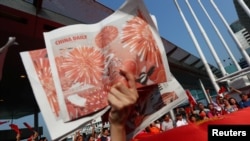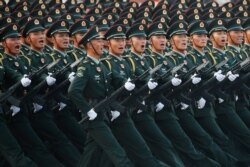China will celebrate seven decades of communist rule on Tuesday with a display of power through central Beijing, showing off goose-stepping troops, new missiles and floats celebrating the country's technological prowess.
The event is the country's most important of the year as China looks to project an image of confidence in the face of mounting challenges, including three months of anti-government protests in the territory of Hong Kong and a bitter trade war with the United States.
President Xi Jinping will oversee a massed military parade, with 15,000 troops marching through part of Tiananmen Square, as jet fighters scream overhead.
Xi, whose military modernization program has rattled nerves around the region, will likely descend from a podium on the Gate of Heavenly Peace to inspect the ranks, though exact details have been kept under wraps ahead of time.
Xi remains broadly popular in China for his aggressive campaign against corruption and for propelling what is now the world's second-biggest economy to the forefront of global politics.
But the Communist Party remains nervous about its grip on power and international standing.
The capital has been locked down for the parade. Police have told residents whose houses look onto the parade route warned not to look out their windows.
There will be a civilian parade too, of students, model workers, ethnic minorities and even a few foreigners, walking alongside or traveling in floats celebrating China's achievements, officials said last week.
Once the show is over, 70,000 doves will be released to symbolize peace, according to state media.
In the evening, fireworks will light up Beijing.
Xi faces mounting challenges, notably in Hong Kong, where more large-scale protests are expected on Tuesday. Police there have warned of "very serious violent attack."
Hong Kong leader Carrie Lam is in Beijing for the anniversary celebrations.
Another challenge is Chinese-claimed Taiwan, a free-wheeling democracy with little interest in being run by Beijing and which holds presidential elections in January.
There are also restive minorities in Tibet and heavily Muslim Xinjiang, where China has faced international opprobrium for detaining up to one million ethnic Uighurs in what China calls a de-radicalization scheme.






